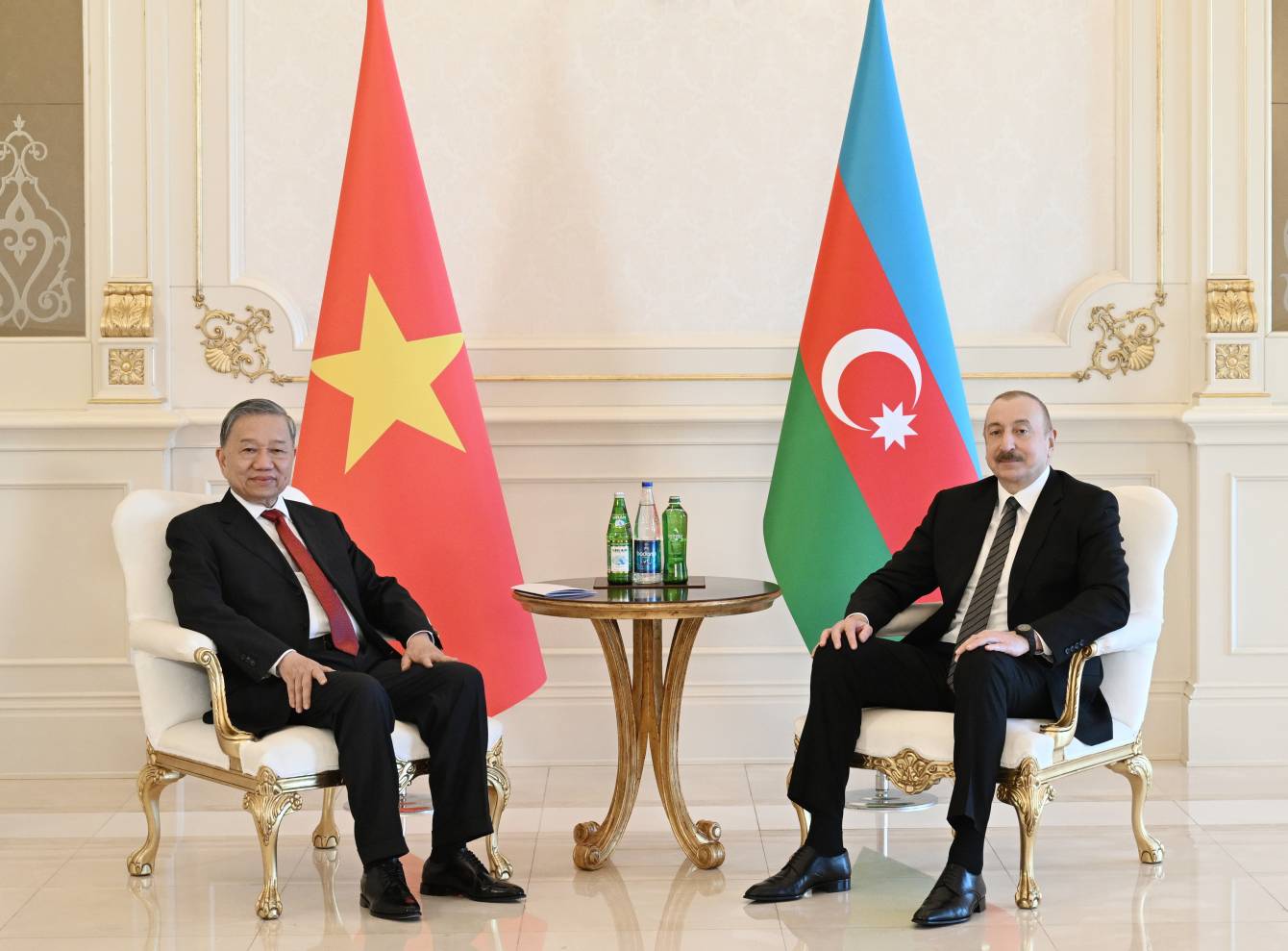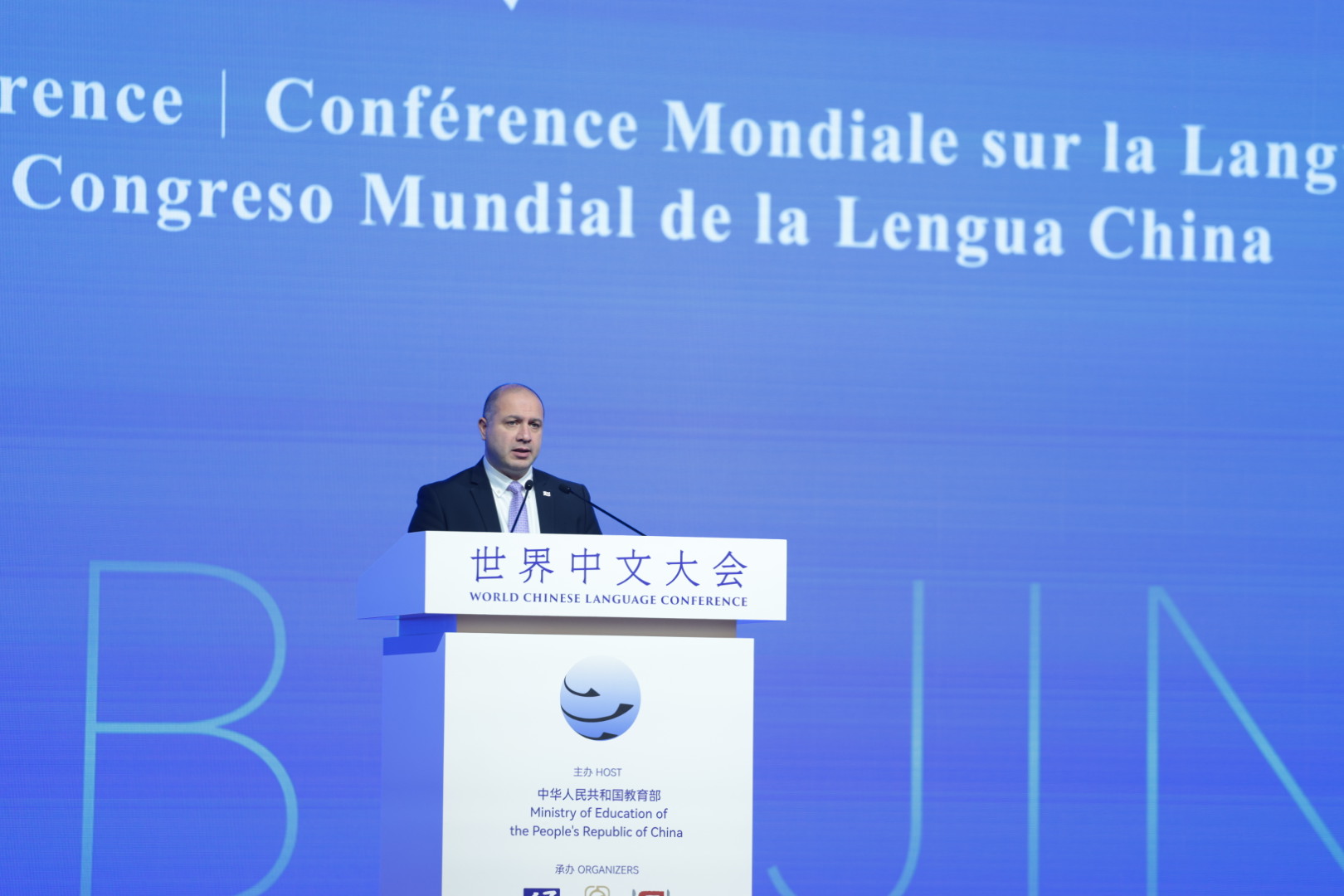
Azerbaijan and Vietnam Forge Strategic Ties
Azerbaijan and Vietnam Forge Strategic Ties
Executive Summary:
- Azerbaijan and Vietnam established an official strategic partnership during General Secretary of the Communist Party of Vietnam Tô Lâm’s May 7–8 visit to Baku, signing major agreements in energy, defense, science, trade, and culture to expand bilateral cooperation.
- Key economic deals include energy collaboration between the State Oil Company of the Republic of Azerbaijan (SOCAR) and Petrovietnam, logistics partnerships, and a business council. Both countries aim to boost trade, diversify exports, and connect markets across Eurasia and Southeast Asia.
- Azerbaijan is leveraging its roles in the People’s Republic of China’s One Belt One Road initiative and the Trans-Caspian International Transport Route to more deeply integrate into Asia-Europe trade networks, while Vietnam is orienting its exports within these routes.
Azerbaijan and Vietnam formally elevated their 33-year diplomatic relationship to a strategic partnership during General Secretary of the Communist Party of Vietnam Tô Lâm’s visit to Baku from May 7 to 8 (Vietnam+, May 7). After signing a joint declaration to form a strategic alliance, Azerbaijani President Ilham Aliyev and Tô Lâm established numerous cooperation agreements across various sectors, including energy, defense, and culture. Aliyev described the pact as a “very serious political document” that upgrades relations, pledging to turn the signed agreements into concrete projects (President of the Republic of Azerbaijan, May 7). Tô Lâm likewise hailed the visit as a new era in the history of relations between the two countries, noting that deepened ties would leverage each side’s strengths for mutual development (Anadolu Agency, May 8). This first visit by a Vietnamese Communist Party leader to Azerbaijan underscored Hanoi’s commitment to broader engagement with the Caucasus.
Immediately following the declaration of the strategic partnership, senior officials from both countries outlined concrete steps for its implementation. On May 8, Azerbaijan’s Foreign Minister Jeyhun Bayramov met with Vietnam’s Deputy Prime Minister and Minister of Foreign Affairs Bùi Thanh Sơn in Baku to discuss follow-up steps (APA, May 7). Both sides emphasized the importance of reviving the long-dormant Vietnam-Azerbaijan Intergovernmental Commission and establishing regular political consultations (Vietnam News, May 9). Aliyev and Tô Lâm also pledged to intensify engagement at all levels, including state-to-state, party-to-party (between the Communist Party of Vietnam and the New Azerbaijan Party), parliamentary, and local government exchanges (Vietnam News, May 8). Representatives of Vietnam and Azerbaijan also signed several key sectoral agreements during the visit, signaling a strong commitment to expanding bilateral cooperation.
Azerbaijan’s Ministry of Energy and Vietnam’s Ministry of Industry and Trade signed a government-level Memorandum of Understanding (MoU) on energy cooperation. The State Oil Company of the Republic of Azerbaijan (SOCAR) and Vietnam’s state oil company, Petrovietnam, signed a separate agreement for joint exploration and service provision (Interfax, May 7). Another MoU outlined the long-term supply of Azerbaijani crude oil to Vietnam’s Dung Quat refinery (Vietnam+, May 8). While Azerbaijan’s exports to Vietnam remain predominantly crude oil-based, both governments have emphasized their commitment to diversifying their trade portfolio (Trading Economics, accessed May 14).
Aliyev identified renewable energy as a promising area for cooperation, expressing readiness to invest in Vietnam’s clean energy (Caliber, May 8). He highlighted that Azerbaijan’s ongoing projects are expected to generate approximately 6,500 megawatts of clean energy over the next five years and invited Vietnamese companies to participate in wind and solar energy investments (Trend News Agency, May 7). Given the currently limited economic exchanges, the recently signed energy agreements demonstrate an intention to strengthen economic collaboration between the two nations (Report News Agency, May 8; Caspian Post, May 10).
Both governments committed to reactivating their intergovernmental Commission on Trade and Science as a mechanism to promote mutual investment and economic collaboration (AZERNEWS, May 8). To this end, Vietnam’s Binh Son Refining and Petrochemical Company signed an MoU with Azerbaijan’s Ministry of Economy to secure long-term oil supplies (Report News Agency, May 8). Vietnam’s Ministry of Science and Technology also reached an agreement with Azerbaijan’s Ministry of Digital Development and Transport to collaborate on information technology and digital infrastructure (Vietnamese Ministry of Science and Technology, May 8; AZERTAC, May 9). Moreover, Azerbaijan’s Small and Medium Business Development Agency and the Vietnam National Association of Entrepreneurs officially agreed to establish the Azerbaijan–Vietnam Business Council through an MoU. This move intends to strengthen economic ties and business partnerships between entrepreneurs from both countries (Small and Medium Business Development Agency, May 8).
Transport and logistics cooperation has emerged as a key area of focus, underscoring the importance of both countries’ locations on international trade routes. Leaders emphasized that Azerbaijan’s transit corridors could serve as vital links connecting Vietnam with European markets (President of the Republic of Azerbaijan, May 8). Acknowledging Azerbaijan’s strategic geographic location, Aliyev conveyed an interest in establishing a collaborative partnership with Vietnam across the logistics, seaports, railways, and aviation sectors (Ministry of Science and Technology, May 8). During a recent meeting between Bùi Thanh Sơn and Bayramov in Baku, the Azerbaijani minister underscored the significance of the Trans-Caspian International Transport Route (TITR)—also known as the Middle Corridor—as a critical channel for connecting the Middle East, Europe, Russia, and the Association of Southeast Asian Nations (ASEAN) (Vietnam News; Nhan Dan, May 9). Proposed initiatives include direct flights between Baku and major Vietnamese cities to streamline trade and tourism (Trend News Agency, May 6; Report News Agency, May 13). Overall, the strategic partnership will facilitate Vietnamese exports to Europe via Azerbaijan and enable Azerbaijani goods to access Southeast Asian markets through Vietnam (AZERTAC, May 8).
In the defense sphere, Vietnam’s Minister of National Defense Phan Văn Giang held a sideline meeting with his Azerbaijani counterpart, Colonel General Zakir Hasanov, on May 7 in Baku. Both sides expressed interest in pursuing joint ventures in defense technology, enhancing intelligence sharing, and conducting joint training exercises (Caliber, May 7; People’s Army Newspaper, May 8). Legal cooperation also advanced, with the justice ministries of Azerbaijan and Vietnam signing a cooperation program for 2025–2027 (Vietnam+, May 8).
Tourism and grassroots engagement are a priority in Azerbaijan–Vietnam relations. Officials from both countries have advocated for initiatives to promote travel, including the establishment of direct flights and the simplification of visa procedures, to increase visitor flows and foster deeper cultural understanding (Hanoi Times, February 8, 2023). In the cultural sphere, the relevant ministries also signed an MoU to organize joint cultural festivals, sporting events, and youth exchange programs, aiming to strengthen people-to-people ties (VnEconomy, May 8).
The Azerbaijan–Vietnam partnership extends into global and regional dimensions. Both countries have reaffirmed their mutual support in multi-state forums. Their joint statements explicitly reference cooperation within the United Nations, the Non-Aligned Movement, and the Conference on Interaction and Confidence-Building Measures in Asia (AZERNEWS, May 8).
Regionally, the Azerbaijan–Vietnam partnership is increasingly viewed as a bridge between Eurasia and Southeast Asia. Official statements emphasize Azerbaijan’s potential to serve as a gateway to Europe and the Middle East for ASEAN exports while positioning Vietnam as a conduit for the Caucasus’ access to Asian markets. Azerbaijan is leveraging its role in the People’s Republic of China’s One Belt One Road initiative and the TITR to more deeply integrate into Asia–Europe trade networks. Meanwhile, Vietnam is working to align its trade routes with those of ASEAN. The Azerbaijan–Vietnam strategic partnership strengthens bilateral relations and knits their respective regions closer together by aligning development priorities, enhancing connectivity, and reinforcing shared security and economic agendas on the global stage.


